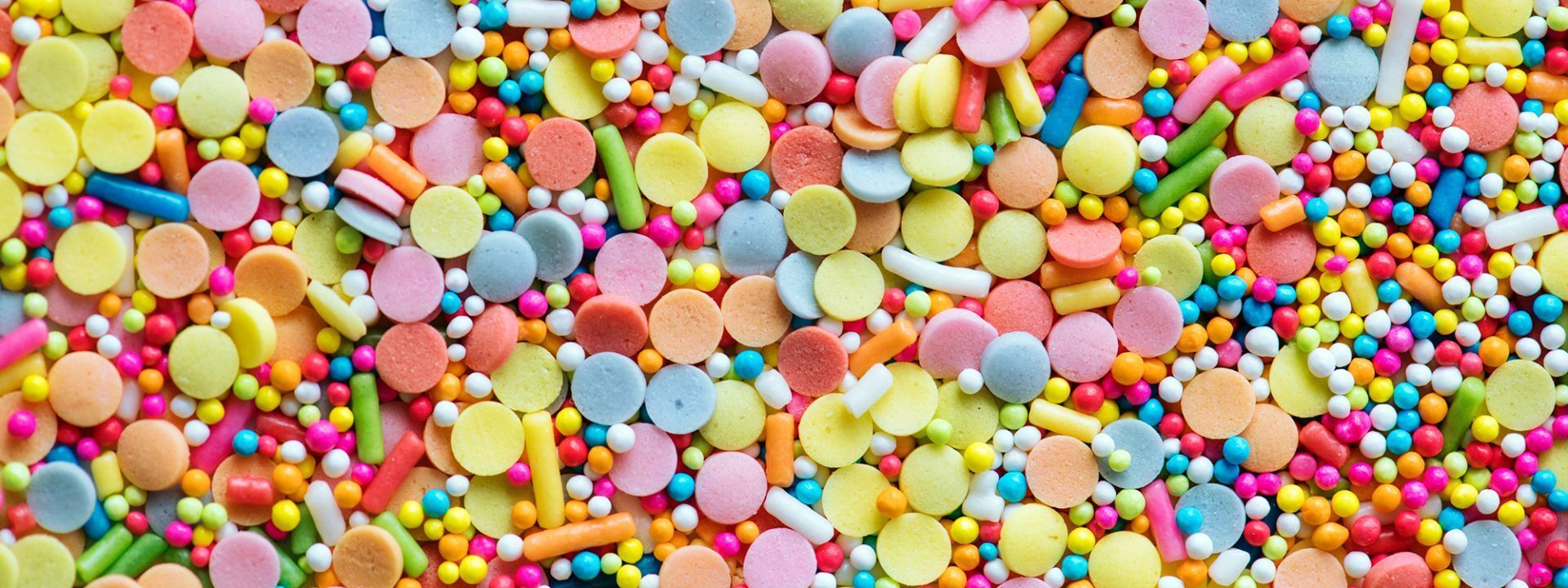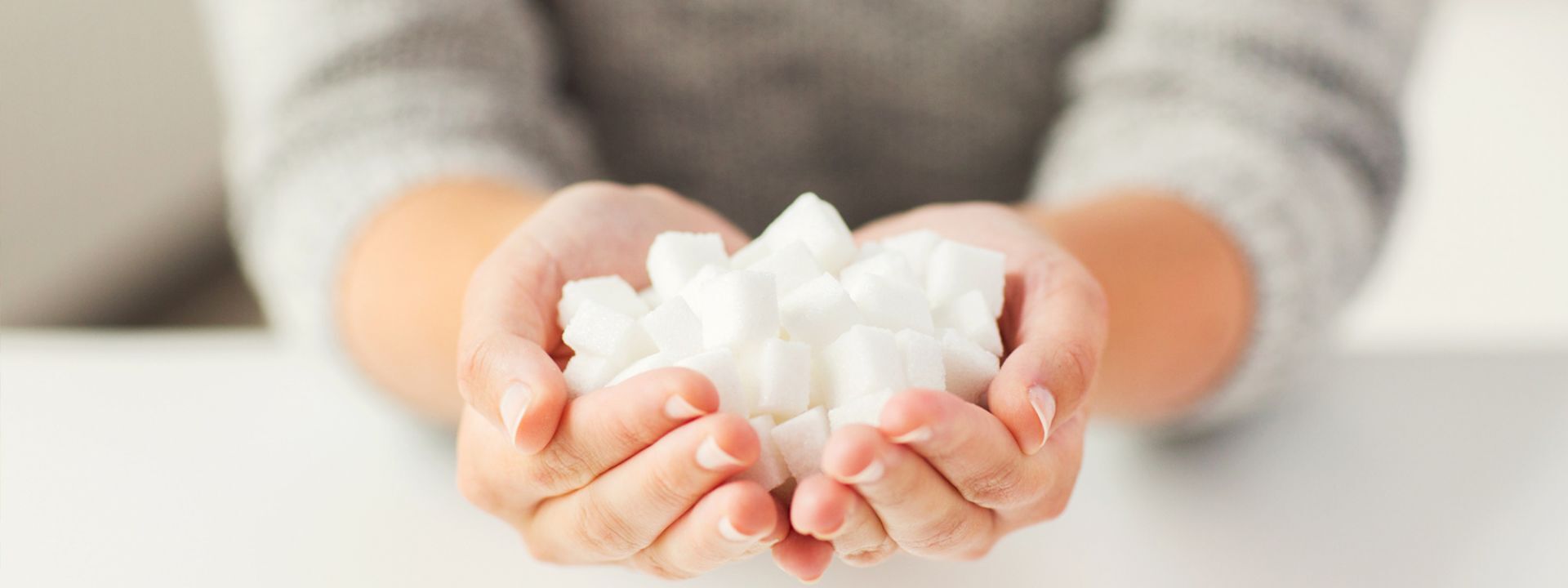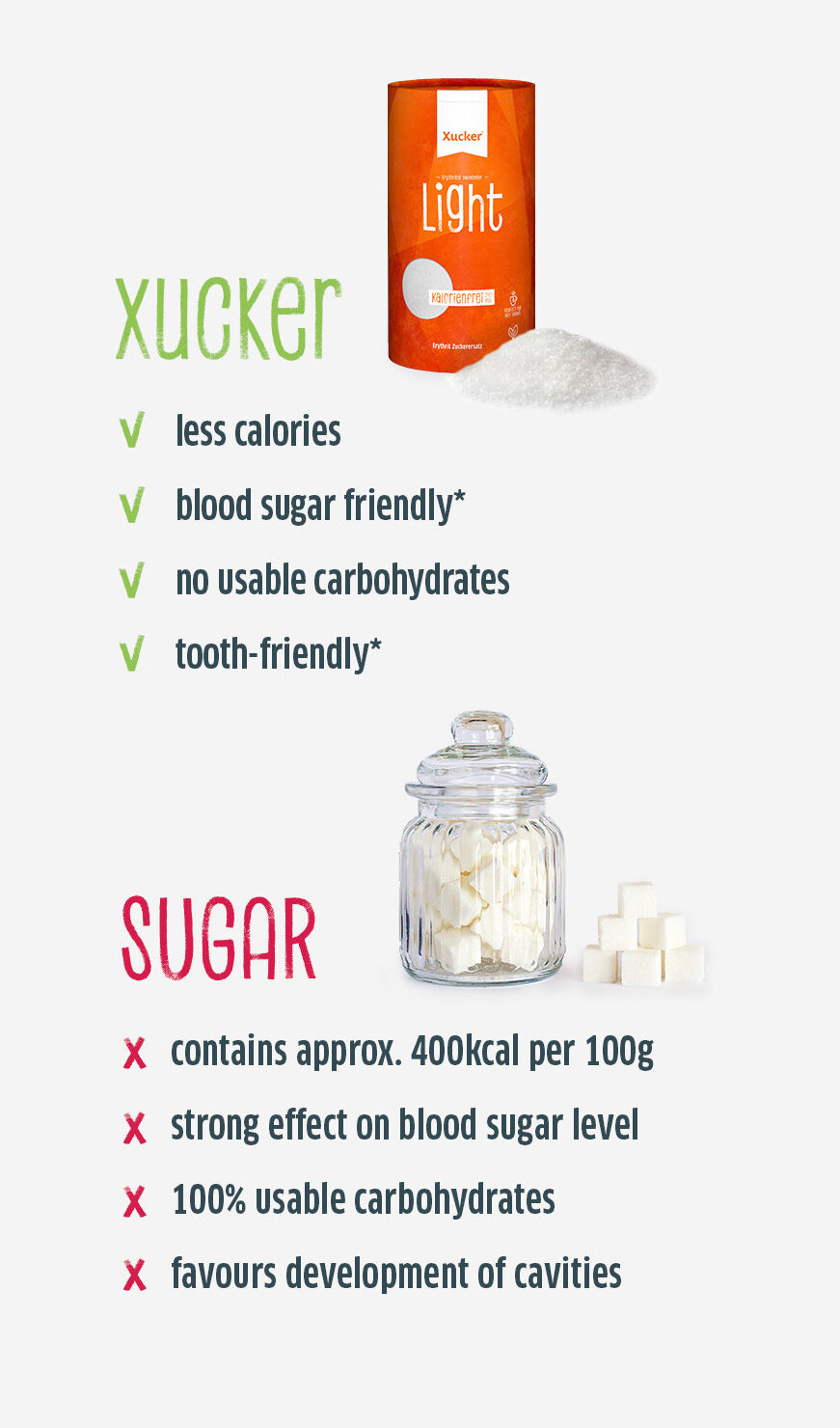If you are looking for the best sugar substitute
Sugar substitute, sugar alternative, sweetener, sweetener - there are many words for sweet substances that we can use to replace sugar in our foods and meals. BUT: Only a few are recommended, because hardly any of them are much better than sugar. Especially agave syrup, maple syrup, honey, panela, fructose-glucose syrup or other supposed alternatives to crystalline industrial sugar consist for the most part only of types of sugar, of which fructose is the most problematic.

Warum wir weniger Zucker essen sollten
- Wie der amerikanische Kinderazt Robert Lustig ausführt: Zucker kann suchtähnliche Symptome verursachen. Der Zuckerkonsum setzt Botenstoffe frei, die das Belohnungssystem im Gehirn aktivieren, ähnlich wie beim Konsum von Drogen. Gerade in stressigen Situationen ist das Verlangen deshalb besonders groß. Trotzdem macht dich Zucker unterm Strich unglücklich.
- Hoher Zuckerkonsum fördert Übergewicht: Zucker wird – im Übermaß konsumiert – nicht verbraucht, sondern als Fett eingelagert. Übergewicht und Folgeerkrankungen wie Typ 2-Diabetes können die Folge sein.
- Zu viel Zucker kann dein Immunsystem schwächen: Zucker kann sich an Zell-Eiweiße lagern und zur Zellalterung beitragen, aber auch die nützlichen weißen Blutkörperchen schädigen, die uns vor Krankheiten schützen.
- Zucker fördert Karies: Karies-Bakterien lieben Zucker. Sie ernähren sich von dem klebrigen Stoff und sorgen für ein zu saures Milieu im Mund – die perfekte Ausgangslage für Löcher in deinen Zähnen.

Was ist alles Zucker?
Mit „Zucker“ ist landläufig der weiße Kristallzucker gemeint, der chemisch als Saccharose oder Sucrose bezeichnet wird – ein Zweifachzucker, der sich aus Gluose und Fructose zusammensetzt. Zucker wird entweder aus Zuckerrüben (Europa) oder Zuckerrohr (Südamerika) gewonnen. Er wird in unterschiedlichsten Varianten angeboten: es gibt ihn in Form von Zuckerwürfeln, großen Kristallen (Kandis), Granulat (Hagelzucker), als kegelförmigen Zuckerhut, flüssig als Sirup oder gemahlen als Puderzucker. Auch Mischungen wie Gelierzucker (mit Pektin) oder Vanillezucker sind in der Küche weit verbreitet. Allerdings wird er am meisten als Zutat in fertigen Genuss- und Lebensmitteln konsumiert, sei es in Schokoladen, Eis, Keksen, Kuchen, Süßspeisen und Erfrischungsgetränken. In größeren Mengen ist Zucker in Soßen, Ketchup, Fruchtaufstrichen usw. zu finden. So ist es kein Wundern, dass in Deutschland pro Kopf viermal mehr Zucker gegessen wird, als die Weltgesundheitsorgnisation (WHO) empfiehlt: ca. 95 g statt 25 g täglich. Das sind ca. 35 kg Zucker jährlich. Und da ist der natürliche Zucker aus Obst noch nicht mit eingerechnet ...
Unter dem Begriff „Kohlenhydrate“ werden aber auch weitere Mono-, Di-, Oligo- und Polysaccharide zusammengefasst. Das sind ganz simpel übersetzt Einfach-, Zweifach-, Mehrfach- und Vielfachzucker:
- Einfachzucker = Glucose (Traubenzucker), Fructose (Fruchtzucker), Galactose (Schleimzucker)
- Zweifachzucker / Mehrfachzucker = Saccharose (Rohrzucker/Rübenzucker), Lactose (Milchzucker), Maltose (Malzzucker)
- Vielfachzucker = Amylose (Stärke), Glycogen, Pektin, Chitin, Cellulose
- Der Zucker in unserer Nahrung hat einen physiologischen Brennwert von 16,8 kJ, bzw. 4,0 kcal pro Gramm.



Xucker ist der bessere Zuckerersatz!
Xucker ist eine prima Alternative für all jene, die sich gesund ernähren wollen, ohne auf süßen Genuss zu verzichten. Kalorienreduziert bzw. kalorienfrei und obendrauf noch zahnfreundlich – was will man mehr? Und das Beste: Xucker ist auch für Diabetiker und Kinder geeignet! Probier's mal!
Zuckerersatz von Xucker
Xucker Light aus Erythrit – der kalorienfreie Zuckerersatz
Xucker Light ist die beliebte Zuckeralternative ohne Kalorien. Dadurch ist die Verwendung von Xucker Light in Gebäcken und Desserts blutzuckerfreundlich, ideal für unbelasteten Genuss. Das macht den „leichten“ Zuckerersatz besonders beliebt bei Diabetikern, Sportlern oder während Diäten. Noch dazu ist Xucker Light zahnfreundlich, schadet als Zuckerersatz in Getränken ohne Zucker den Zähnen nicht. Mit Xucker Light kaufst du reines Erythrit aus Europa. Produziert wird es in Frankreich aus Maisstärke bzw. daraus hergestellter Glucose, die mit Hilfe von Hefekulturen zu Erythrit fermentiert wird. Nach sorgfältiger Reinigung und Kristallisation sieht es aus wie Zucker und schmeckt auch so – ohne dessen Nachteile.
Xucker Premium und Basic Xylit: einfach vorteilhaft
Wer Xylit kaufen möchte, findet bei Xucker zwei hochwertige Zuckeralternativen, die aus nachwachsenden Rohstoffen hergestellt werden. Xucker Premium ist reines Xylit und auch als finnischer Birkenzucker bekannt und wird aus Birken- und Buchenholz gewonnen. Xucker Basic Xylit ist hochwertiges Xylit, kann aber günstiger aus Mais hergestellt werden. Beide sind besser als Zucker: Sie haben 40 % weniger Kalorien, wirken zahnpflegend und können Kariesbakterien an ihrer Ausbreitung hindern.
Achtung beim Zuckerersatz – nicht jede Alternative ist gut!
Zuckerersatz ist nicht gleich Zuckerersatz! Es gibt verschiedene Substanzen, die nur vermeintlich besser als Zucker sind.
* Consumption of foods/drinks containing erythritol/xylitol instead of sugar induces a lower blood glucose rise after their consumption compared to sugar-containing foods/drinks and contributes to the maintenance of tooth mineralisation.


